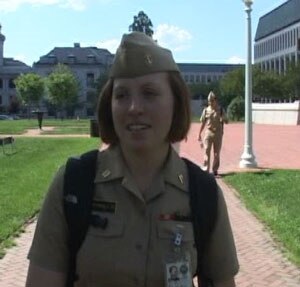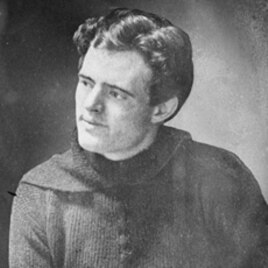
DOUG JOHNSON: Welcome to American Mosaic in VOA Special English.
(MUSIC)
I’m Doug Johnson.
Today we listen to new music from the Deftones...
And we answer a question about a great American writer....
But first we report on an exciting change in the United States Navy.
(MUSIC)
DOUG JOHNSON: The United States Navy has announced that eleven female graduates of its Naval Academy will be among the first American women to serve on submarines. Faith Lapidus tells about the sea-change soon to take place in what is called the “Silent Service.”
FAITH LAPIDUS: Twenty-two-year-old First Class Midshipman Laura Martindale will graduate next Friday from the Naval Academy in Annapolis, Maryland. She will also become one of the first women to serve on a United States Navy submarine. She had no idea that would happen when she arrived at the Academy.
LAURA MARTINDALE: “I always thought submarines were amazing and it wasn’t really something that was open to women when I came to the Naval Academy. I did get to be on a submarine two summers ago and that was it. We went down to depth. I’m driving the submarine and I said ‘Wow, this is for me.’ Thank goodness for Congress and the Admirals that think it’s important because women are going to be on submarines.”
FAITH LAPIDUS: Women make up about fifteen percent of the Navy’s more than three hundred thirty thousand service members. They have been serving on naval ships since nineteen ninety-four. But until now they were barred from submarines.
The Navy says about twenty women will be chosen as the first group to serve on submarines. All will be officers. Non-officers will be considered later. The women will attend a submarine training program. They are expected to begin serving on crews next year or early two thousand twelve. They will serve on two guided-missile and two ballistic-missile subs based in the states of Washington and Georgia.
Critics of the idea say the living areas in submarines are too small and narrow for men and women to serve together. They say close physical contact is impossible to avoid.
But the commander of naval submarine forces, Vice Admiral John Donnelly, disagrees. He says the Navy has to choose submariners from the widest possible group of skilled service members. He says that is how the Navy will continue to have what he calls the “best submarine force in the world.”
Women already serve on submarines in the national navies of Australia, Canada, Norway and a few other countries.
(MUSIC)
DOUG JOHNSON: Our listener question comes from a student in China. Han Linyuan wants to know about the famous writer Jack London.
Jack London is considered to be one of America’s finest writers. He was born in San Francisco, California in eighteen seventy-six. He left school at the age of fourteen. But he loved to read and spent many days at public libraries. At an early age, Jack London knew he wanted to become a writer. But he had many other interests as well. He loved to sail, and he traveled many times across the Pacific Ocean.

When he was twenty-one, he went to search for gold in Alaska and Canada. HHe also worked as a laborer, a factory worker and an oyster fisherman. He even spent some time traveling around America on freight trains.
Jack London remembered all these trips and jobs when he began writing professionally. Some of his most famous books are “The Call of the Wild”, “White Fang” and “The Sea-Wolf.” His best known short story is “To Build a Fire.” It tells of a man who falls into a stream in the coldest part of Canada. He knows that his life depends on his success in making a fire to warm himself and dry his clothes. Many of Jack London’s books and short stories tell about man’s struggle with nature.
In eighteen ninety-six, Jack London began to speak about and support socialism. He said his views were influenced by the many poor and working class people he had met in his life. Two of his books deal with the ideas of socialism. They are “The Iron Heel” and “The Cruise of the Snark.” The Snark was the name of a boat.
Jack London became rich and famous by publishing many stories and books. He reportedly wrote at least one thousand words every day.
Near the end of his career, Jack London bought a farm and a ranch in Sonoma, California. But his life was cut short by kidney problems. He died at the young age of forty in nineteen sixteen.
You can hear his famous short story “To Build a Fire.” We have a link on our website, voaspecialenglish.com.
(MUSIC)
DOUG JOHNSON: The Deftones have been playing music since nineteen eighty-eight. The band just released its sixth studio album. “Diamond Eyes” opened at number six on Billboard magazine’s top two hundred albums chart. Mario Ritter has more on the band and music from the new record.
MARIO RITTER: In two thousand eight, tragedy struck the Deftones. Bass player Chi Cheng was involved in a serious car accident in Sacramento, California. His brain injuries are severe. He has never fully woken since the crash.
The Deftones were putting the finishing touches on their sixth album, “Eros,” when Cheng got hurt. They never felt right about returning to it.
Now the Deftones have completed a different sixth album, “Diamond Eyes.” Deftones’ friend Sergio Vega is playing bass in Cheng’s absence. But, drummer Abe Cunningham says Cheng’s influence can be felt throughout the whole album. “How could it not be?” Cunningham said.
Here the Deftones perform the title track from “Diamond Eyes.”
(MUSIC)
The Deftones are from Sacramento. Cunningham, lead singer and guitarist Chino Moreno and guitarist Stephen Carpenter were all childhood friends. They started playing music together in high school. Chi Cheng joined them in nineteen eighty-eight. Keyboardist Frank Delgado came to the Deftones in two thousand.
Listen now to “Beauty School” from “Diamond Eyes.”
(MUSIC)
Chino Moreno says people probably expect this album to be sad. But he says there is a lot of happiness and hope in “Diamond Eyes.” We leave you with his favorite song from the album. Here is “Sextape.”
(MUSIC)
DOUG JOHNSON: I'm Doug Johnson. Our program was written by Jim Tedder and Caty Weaver, who was also the producer.
You can find transcripts, MP3s and podcasts of our shows at voaspecialenglish.com. You can also follow us on Facebook, Twitter and iTunes at VOA Learning English. If you have a question about American life, send an e-mail to mosaic@voanews.com. Please remember to tell us your name and where you live.
Join us again next week for AMERICAN MOSAIC, VOA’s radio magazine in Special English.
(MUSIC)


